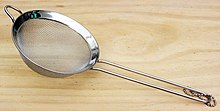sieve
See also: Sieve
English

Etymology
From Middle English sive, syfe, from Old English sife, sibi (“sieve”), from Proto-Germanic *sibi (“sieve”), from Proto-Indo-European *seyp-, *seyb- (“to pour, sieve, strain, run, drip”). Akin to German Sieb, Dutch zeef, Proto-Slavic *sito (Russian си́то (síto), сев (sev), се́ять (séjatʹ)).
Pronunciation
Noun
sieve (plural sieves)
- A device with a mesh bottom to separate, in a granular material, larger particles from smaller ones, or to separate solid objects from a liquid.
- A process, physical or abstract, that arrives at a final result by filtering out unwanted pieces of input from a larger starting set of input.
- 2010, Luke Mastin, “20TH CENTURY MATHEMATICS - ROBINSON AND MATIYASEVICH”, in www.storyofmathematics.com[1], retrieved 2013-09-08:
- Among, [sic] his other achievements, Matiyasevich and his colleague Boris Stechkin also developed an interesting “visual sieve” for prime numbers, which effectively “crosses out” all the composite numbers, leaving only the primes.
- Given a list of consecutive numbers starting at 1, the Sieve of Eratosthenes algorithm will find all of the prime numbers.
- (obsolete) A kind of coarse basket.
- (Can we find and add a quotation of Simmonds to this entry?)
- (colloquial) A person, or their mind, that cannot remember things or is unable to keep secrets.
- (category theory) A collection of morphisms in a category whose codomain is a certain fixed object of that category, which collection is closed under pre-composition by any morphism in the category.
Derived terms
Translations
device to separate larger and smaller objects
|
process that filters out unwanted pieces of input
Verb
Lua error in Module:en-headword at line 1152: Legacy parameter 1=STEM no longer supported, just use 'en-verb' without params
- To strain, sift or sort using a sieve.
- (sports) To concede; let in
- 2017 June 3, Daniel Taylor, “Real Madrid win Champions League as Cristiano Ronaldo double defeats Juv”, in The Guardian (London)[2]:
- This was their seventh defeat out of nine finals, including five in a row, and the second half was a chastening experience for the Serie A champions, culminating in them sieving more goals in one match than in the rest of the competition put together.
Translations
to strain, sift or sort using a sieve
|
- The translations below need to be checked and inserted above into the appropriate translation tables. See instructions at Wiktionary:Entry layout § Translations.
Translations to be checked
Further reading
Hunsrik
| < 6 | 7 | 8 > |
|---|---|---|
| Cardinal : sieve Ordinal : sibt | ||
Pronunciation
Numeral
sieve
- seven
- Das sin schun sieve Uher.
- That's already seven o'clock.
Further reading
Categories:
- English terms inherited from Middle English
- English terms derived from Middle English
- English terms inherited from Old English
- English terms derived from Old English
- English terms inherited from Proto-Germanic
- English terms derived from Proto-Germanic
- English terms derived from Proto-Indo-European
- English 1-syllable words
- English terms with IPA pronunciation
- English terms with audio links
- Rhymes:English/ɪv
- English lemmas
- English nouns
- English countable nouns
- English terms with usage examples
- English terms with obsolete senses
- Requests for quotations/Simmonds
- English colloquialisms
- en:Category theory
- en:Sports
- English terms with quotations
- Hunsrik 2-syllable words
- Hunsrik terms with IPA pronunciation
- Hunsrik lemmas
- Hunsrik numerals
- Hunsrik cardinal numbers
- Hunsrik terms with usage examples